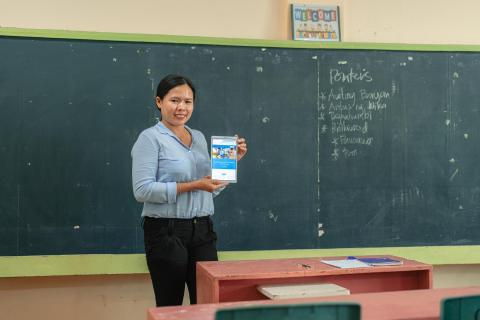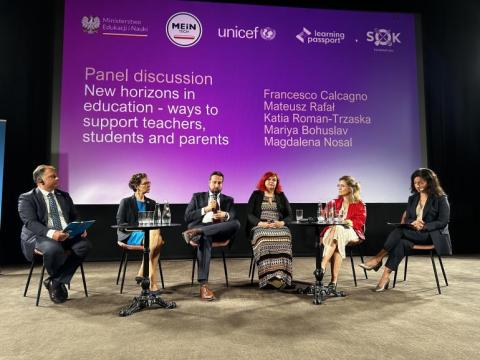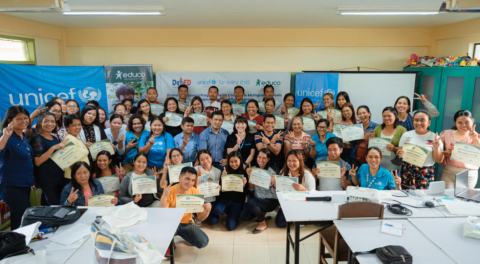Puntland – Learning continuity during COVID-19 and beyond
UNICEF Education COVID-19 Case Study

The Government of Puntland’s COVID-19 school closures from March 2020 until early September 2020, affected over 250,000 learners (112,500 girls) of all educational levels. With face-to-face education disrupted for the foreseeable future, the Ministry of Education and Higher Education of Puntland (MoEHE) began exploring digital education, determining that video lessons would be the most effective for learners. The MoEHE partnered with UNICEF to roll out the Learning Passport in Puntland. This is a digital learning platform developed by UNICEF, Microsoft and informed by research undertaken by the University of Cambridge. It is free of charge for education authorities and users. UNICEF provided guided support to the MoEHE to adjust the platform to meet the specific needs of the Puntland education sector. In July 2020, the MoEHE officially endorsed the Learning Passport and its mobile phone application, Cilmi (meaning ‘knowledge’ in Somali), as its only official learning platform.
Not only was Puntland the first state in Somalia to endorse the Learning Passport, but it was also the first place to do so on the African continent. At the Learning Passport’s official launch, Puntland’s Minister of Education and Higher Education, the Honourable Abdullahi Mohamed Hassan, remarked that, “children will be able to access high quality lessons in line with the official curriculum and not become hidden victims of the COVID-19 crisis by missing out on an education.”
RESULTS
-
The Puntland Development Research Center (PDRC) and the MoEHE in partnership with UNICEF, and with the financial support of the Global Partnership for Education (GPE), recorded, edited, and published 2,800 audio-visual lessons for all primary and secondary grade learners.
-
217 primary teachers (50 females) trained by the Global Partnership for Education (GPE) in Puntland public schools developed the content for each lesson. An assurance team was subsequently established to review and approve the content before the videos were uploaded onto the Learning Passport platform.
-
8,000 individual accounts have been registered on the Puntland Learning Passport platform. The Puntland Learning Passport mobile application, Cilmi, has been downloaded more than 5,000 times through the Google Play store. Video lessons were broadcasted through TV, aired through radio and uploaded on various social media channels.
LESSONS LEARNED
- Digital learning will continue to support the education sector. Puntland experiences various emergencies annually, including droughts and flooding. Therefore, the MoEHE has decided to integrate digital learning into the education sector; a natural follow-up on the significant financial and human resource investments made into developing digital learning content and the Learning Passport platform. This new learning resource complements classroom-based education, but authorities will still need to consistently promote it to ensure all teachers, parents and learners are aware of its advantages.
- Low-tech and no-tech learning need improvement. A limited percentage of Puntland’s public has access to technology, connectivity, and financial resources to access digital learning. Low-tech or no-tech solutions, such as printed assignments, need to be further developed to ensure accessibility for all learners. Currently, there is no available data on the percentage of students who have had access to digital learning solutions in Puntland during the 2020 school closures. However, the MoEHE in collaboration with UNICEF, is developing a comprehensive assessment tool to determine how vulnerable children could better access learning materials. The results will be used to construct context-specific strategies to address learning challenges, especially for children in remote areas and who are internally displaced.
NEXT STEPS
- The MoEHE is organizing a high-level Puntland Learning Passport/Digital Learning ceremony in September 2021, where the 2,800 recorded lessons will officially be released. The Puntland President and other government officials, civil society, private sector representatives and education actors are expected to attend.
- The MoEHE’s target for the Learning Passport is to have 500,000 learners signed on by 2025. The MoEHE, UNICEF and other partners are planning widespread awareness raising campaigns. In addition, further content will be developed, including assessments, PowerPoint slides and textbook chapters, which will be uploaded onto the platform as supplementary learning materials.
- In 2021, 50 schools will be selected to participate in a pilot initiative. Teachers and Community Education Committee (CEC) members in these schools will be trained on the use of the Learning Passport and their schools will be provided with basic technology in the form of tablets to ensure learners have access to the platform. The MoEHE will assign focal points to support and monitor the schools as they use the platform.
- UNICEF, the MoEHE and local mobile network operators are discussing how the Learning Passport could be accessed at a zero-rating – removing the cost of internet – making it more accessible to vulnerable communities.
Cost effectiveness: UNICEF has invested about US$510,000 on Puntland’s Learning Passport and the Cilmi mobile app reaching some 250,000 learners (roughly $2/ student). While the lessons are now available to Puntland’s more than 250,000 primary and secondary school learners, further investments are needed for training, equipment, connectivity and more, before equitable access is achievable for all learners.
OTHER RESOURCES
For other resources, including more education and COVID-19 case studies, please click here and filter by “Area of Work” (Education).




